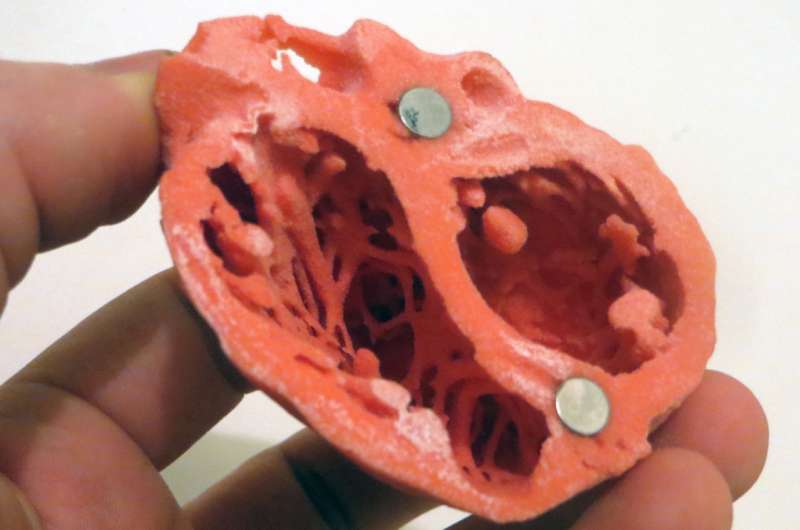Antiplatelet drugs increase risk for TAVR patients with atrial fibrillation

Patients with atrial fibrillation who took oral anticoagulants alone after undergoing transcatheter aortic valve replacement (TAVR) had a lower rate of bleeding complications without an increased risk of clotting-related complications compared to patients who took antiplatelet medication in addition to oral anticoagulants, in a trial presented at the American College of Cardiology's Annual Scientific Session Together with World Congress of Cardiology (ACC.20/WCC).
TAVR, a procedure in which operators thread surgical equipment to the aorta through an artery to replace a patient's malfunctioning valve with an artificial one, has become increasingly popular as a less invasive alternative to open heart valve replacement surgery. An estimated one-third of patients undergoing TAVR have atrial fibrillation, a heart rhythm disorder that leads to a high risk of stroke. The new study, antiplatelet therapy for Patients undergoing Transcatheter Aortic Valve Implantation (POPular-TAVI), is the first randomized trial designed to assess the safety of oral anticoagulants alone as compared to using antiplatelet drugs alongside oral anticoagulants for managing TAVR complication risks in these patients. Anticoagulants work by interfering with proteins involved in the formation of blood clots, while antiplatelet drugs prevent platelets, a type of blood cell, from clumping together.
"The rates of complications for TAVR—especially complications related to bleeding—remain high," said Vincent Nijenhuis, MD, from the cardiology department at St. Antonius Hospital in Nieuwegein, Netherlands, and the study's lead author. "This study helps physicians to better understand the risks of adding antiplatelet therapy to oral anticoagulants—namely, that doing so leads to more bleeding without reducing the rate of ischemic events. I think once physicians are aware of this, they will not treat patients undergoing TAVR so aggressively, leading to better outcomes."
Both bleeding and clotting-related complications (such as stroke and heart attack) can be life threatening, especially among patients undergoing TAVR, who are generally older, have multiple comorbid conditions and are frailer than those who undergo open heart valve replacement. In focusing on patients with atrial fibrillation, who typically take oral anticoagulants for many years, the trial sought to address how best to balance the risk of clots against the increased risk of bleeding that comes with any anticoagulant or antiplatelet therapy.
Researchers enrolled 313 patients with atrial fibrillation undergoing TAVR at 17 sites in four European countries. Half were assigned to take oral anticoagulants alone and half took the antiplatelet drug clopidogrel for three months after TAVR in addition to oral anticoagulants.
At 12 months, those taking oral anticoagulants alone were significantly less likely to suffer bleeding complications than those who took oral anticoagulants plus clopidogrel, meeting the trial's prespecified composite primary endpoint. The first component of the composite primary endpoint, all bleeding as assessed with the Valve Academic Research Consortium (VARC) definition, occurred in 21.7% of those receiving only oral anticoagulants and 34.6% of those receiving clopidogrel. The second component, non-procedural bleeding as assessed with the Bleeding Academic Research Consortium (BARC) criteria, occurred in 21.7% of those receiving only oral anticoagulants and 34% of those receiving clopidogrel. This reflects a 43% reduction in the rate of bleeding complications among those taking oral anticoagulants alone.
In a secondary analysis, patients taking oral anticoagulants alone did not show an increased risk of clotting-related complications, meeting the trial's prespecified secondary endpoint for non-inferiority. A composite of cardiovascular death, ischemic stroke and heart attack occurred in 13.4% of those receiving only oral anticoagulants and 17.3% of those receiving clopidogrel, while a composite of those outcomes plus non-procedural bleeding occurred in 31.2% of patients receiving only oral anticoagulants and 45.5% of patients receiving clopidogrel.
"The results suggest it would be beneficial to not give clopidogrel—in fact, it's safer because it does not lead to as many bleeding events," Nijenhuis said.
The study is limited by its open label design, which means patients and doctors were aware of which patients had been randomized to receive clopidogrel versus oral anticoagulants alone, although outcomes were adjudicated by independent evaluators who were blinded to patients' treatment status. In addition, Nijenhuis said that the study's findings are only applicable to patients with atrial fibrillation. The researchers are assessing antiplatelet management in patients without atrial fibrillation in a separate cohort of the ongoing POPular TAVI study. Other studies are underway to assess other types of anticoagulation medications such as direct oral anticoagulants.
This study was simultaneously published online in the New England Journal of Medicine at the time of presentation.
More information: Vincent J. Nijenhuis et al. Anticoagulation with or without Clopidogrel after Transcatheter Aortic-Valve Implantation, New England Journal of Medicine (2020). DOI: 10.1056/NEJMoa1915152
















